-- At the Orda glass plant in southwest Kazakhstan's Kyzylorda Region, the civil engineering work has almost come to an end.
-- In the capital Nur-Sultan, ancillary work has resumed at a ring road after four weeks of suspension.
-- In the west Atyrau Region, construction of the country's largest petrochemical complex built by the China National Chemical Engineering Group keeps nonstop operation amid the pandemic.
-- With strong mutual trust and concerted efforts, the Belt and Road cooperation between the two neighbors has yielded tangible results.
By Ren Jun, Zhang Jiye
NUR-SULTAN, May 12 (Xinhua) -- Kazakhstan is facing a tough time economically as it is grappling with a nationwide lockdown and low oil prices due to the raging novel coronavirus epidemic. Amid mounting challenges, the implementation of key Chinese-Kazakh cooperation projects has been pressing ahead, showing resilience and vitality of the Belt and Road Initiative (BRI).
After months of restrictions, the Central Asian country ended a nationwide state of emergency on Monday, following the gradual and cautious economic reopening since the end of April. The Chinese-Kazakh cooperation projects, with many having resumed operations or continued unabated, are helping the oil-rich country get through its socio-economic disturbance.
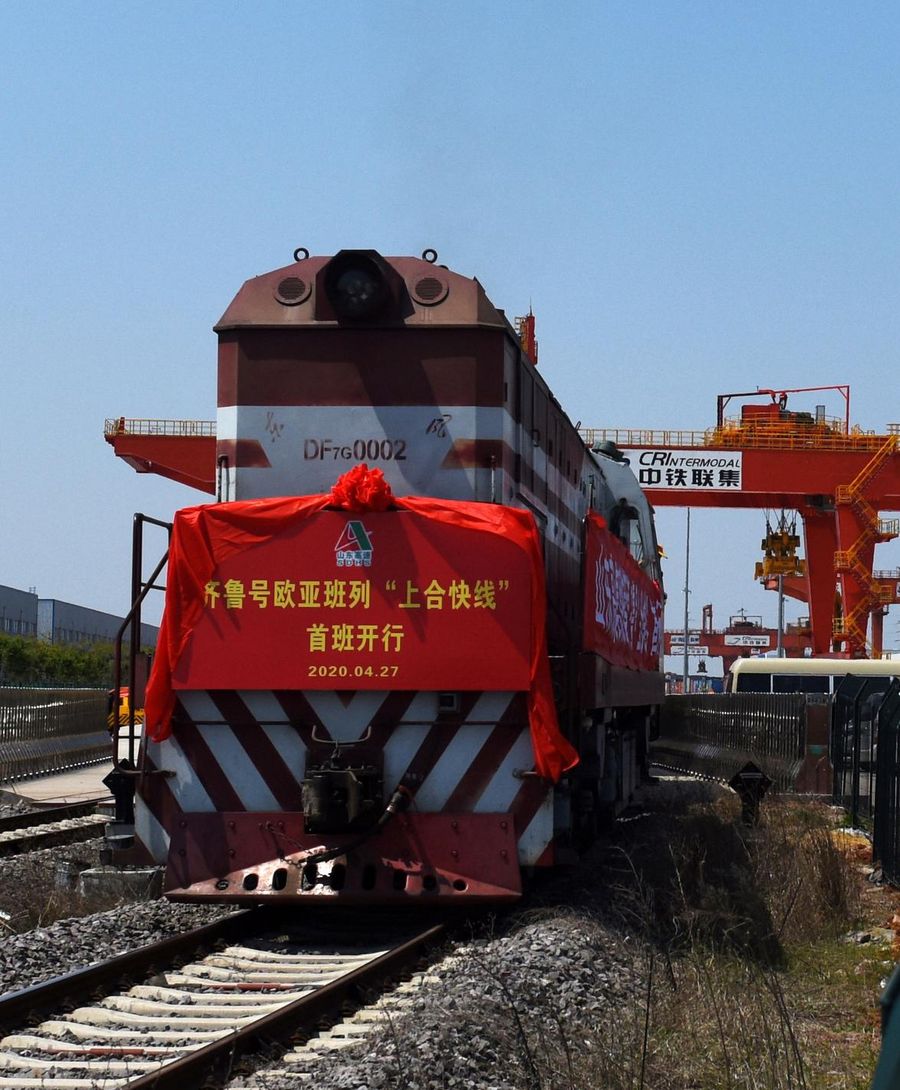
A freight train departs for Almaty of Kazakhstan, at a transit center in Jiaozhou, east China's Shandong Province, April 27, 2020. (Xinhua/Wang Zhaomai)
HOPE IN EPIDEMIC
At the Orda glass plant in southwest Kazakhstan's Kyzylorda Region, the civil engineering work has almost come to an end, while hundreds of Chinese and Kazakh workers are busy installing key equipment, including melting furnace and molten tins.
The plant, contracted by China Triumph International Engineering Co., Ltd, is designed to produce about 200,000 tons of world-class float glasses each year. Once put into operation, it will become the country's first float glass factory and also the largest production line in Central Asia.
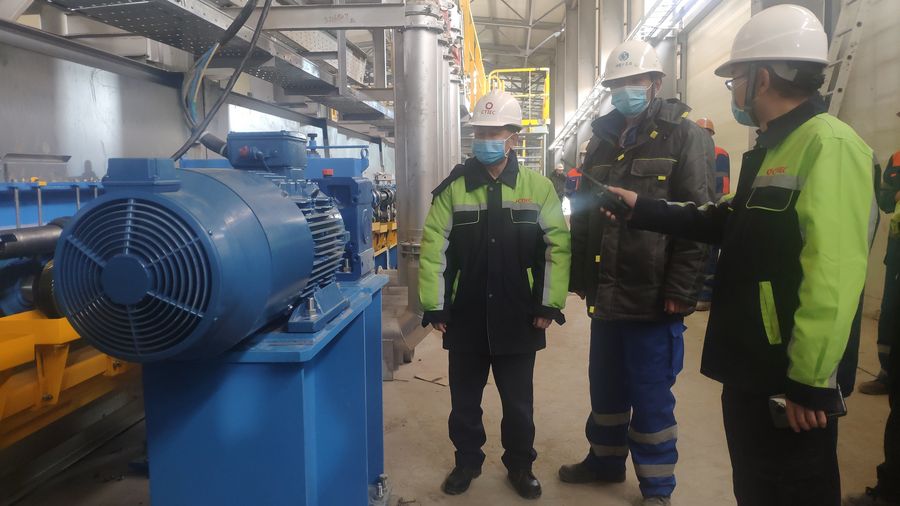
Engineers discuss installation works at Orda glass plant in Kyzylorda, Kazakhstan, April 25, 2020. (China Triump International Engineering/Handout via Xinhua)
"In spite of all hardships, we push ahead with the installation work while adopting strict anti-epidemic measures," said Shan Xu, general manager of the project, adding that the factory is slated to make the country's first piece of floating glass by December this year.
"The construction site is managed in a closed way to ensure it is kept apart from outside world as much as possible. All Chinese and Kazakh staff have their temperature checked three times a day. Complete disinfection is carried out on a daily basis," said the general manager.
In the west Atyrau Region, construction of the country's largest petrochemical complex built by the China National Chemical Engineering Group keeps nonstop operation amid the pandemic. As a key cooperation project between China and Kazakhstan, it will produce up to 500,000 tons of polypropylene per year and provide more than 2,000 jobs after it is completed.
"Since the end of January, we have done concrete casting of 15,000 cubic meters and installation of 4,000 tons of steel structure," said construction manager Wang Xuefeng.
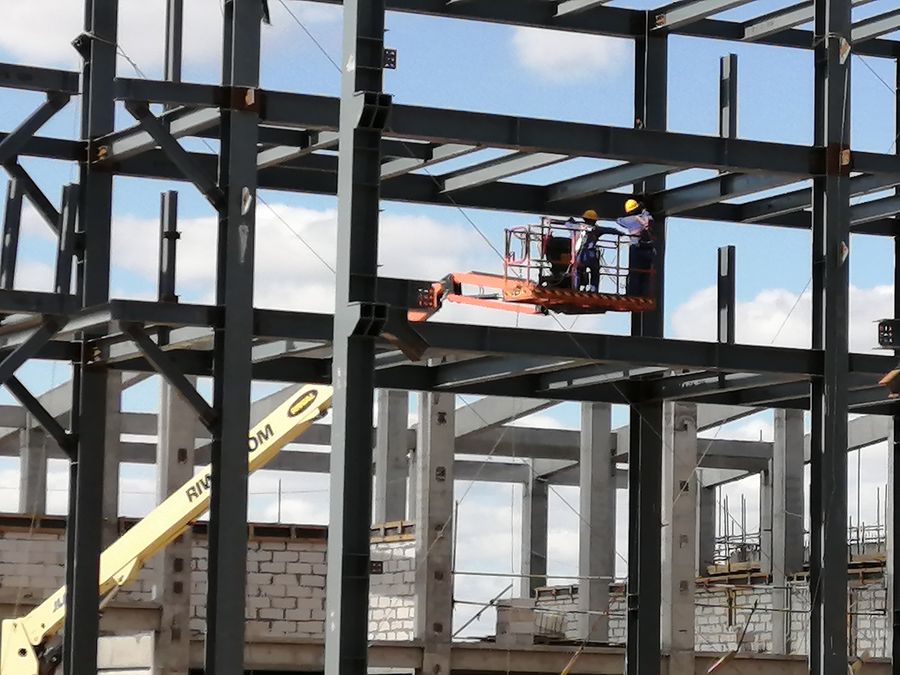
The cellphone photo shows people working at the construction site of an integrated petrochemical complex in Atyrau, Kazakhstan, April 26, 2020. (China Civil Engineering Construction Corporation/Handout via Xinhua)
To cope with the burning shortage of personnel and equipment, the project team has made the best use of local resources by increasing localized procurement and facilitating the timely delivery of chemical equipment through the Horgos Port in northwest China's Xinjiang Uygur Autonomous Region, said project manager Wang Lin.
"The project is of great significance for empowering Kazakhstan's industrial capacity, as it will enable Atyrau to produce polypropylene for the first time and even export it to other countries," said Aijamal Nasybullina, chief of office for the Kazakh branch of the China National Chemical Engineering Group.
Near the Kazakh-Russian border in the Kostanay Region, a wind farm contracted by Chinese firm Universal Energy is under fully-fledged construction. A total of 16 giant turbine foundations are being built, where hundreds of Chinese and Kazakh workers are binding reinforced steel bars and doing casting work.
Several days later, three shipments of Chinese-made wind power equipment, including the turbine generator, 70-meter-long blades and accessories, will arrive at the farm after a 7,000 km-long journey from east China. "If all goes well, the turbines can be erected in early July and put into operation before the end of December," said Zhang Yin, vice president of Universal Energy.
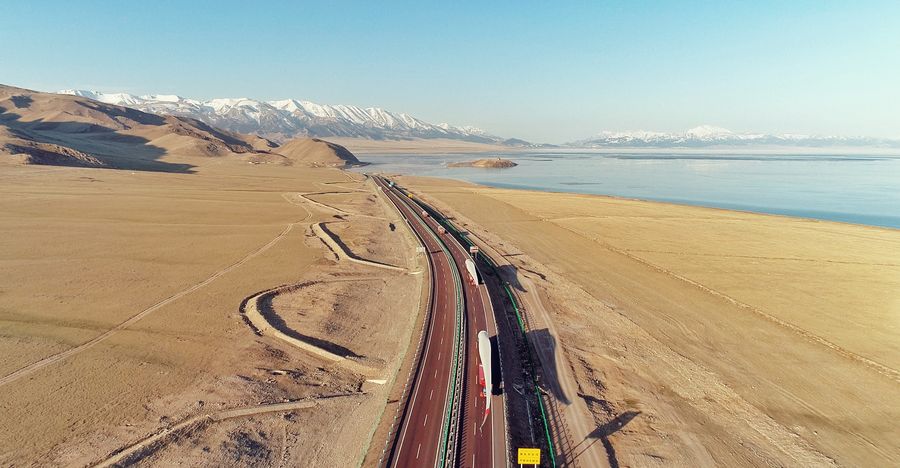
Photo taken on April 24, 2020 shows trucks loaded with wind turbine blades running on a road along the Sayram Lake basin in northwest China's Xinjiang Uygur Autonomous Region. These wind turbine blades are used for a 50-megawatt wind farm in Kazakhstan's Kostanay Region. (Universal Energy/Handout via Xinhua)
B&R COOPERATION CONTINUES
The Orda plant and the petrochemical factory are among the over 50 joint projects between China and Kazakhstan under the framework of the China-proposed BRI, which involves infrastructure development, trade and investment facilitation, and people-to-people exchanges aimed at enhancing connectivity on a trans-continental scale.
With strong mutual trust and concerted efforts, the Belt and Road cooperation between the two neighbors has yielded tangible results. According to the General Administration of Customs of China, the two-way trade in 2019 reached nearly 22 billion U.S. dollars, with a 10.6-percent year-on-year growth.
Despite the temporary impact of the epidemic, Aidar Amrebayev, senior researcher of the Scientific Committee of the Ministry of Education and Science of Kazakhstan, has confidence in the two countries' cooperation. The quick resumption of China-Europe Express Railway since March shows the resilience of the BRI, he said, noting that "Kazakhstan and China will continue to promote cooperation under the Belt and Road framework with high quality in the post-epidemic era."
Countries along the Belt and Road also remain the ideal investment destinations for Chinese investors.
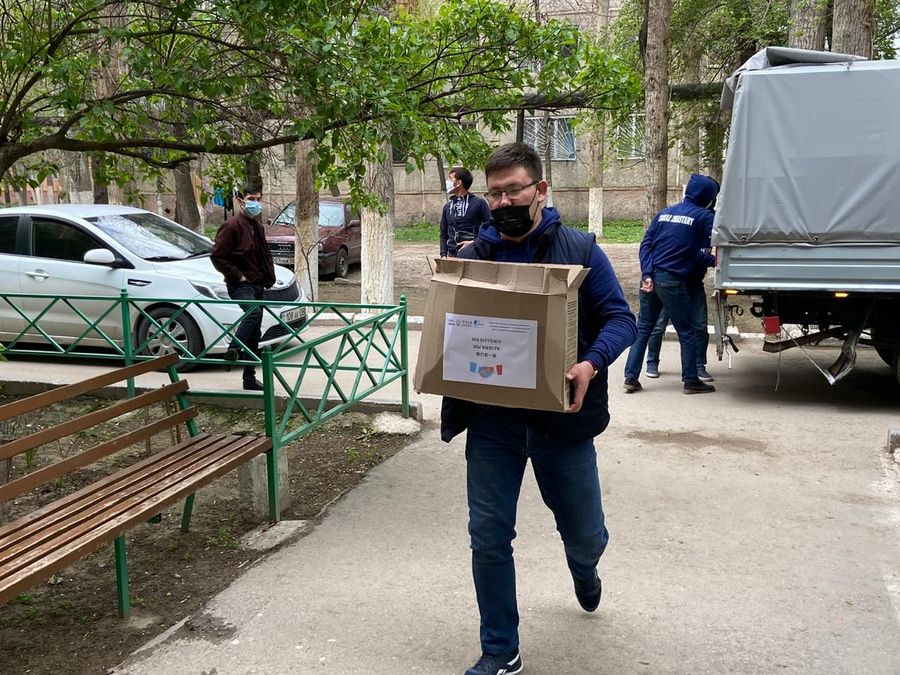
A volunteer delivers food donated by Kazakh branch of the China Civil Engineering Construction Corporation (CCECC) to poor families in Zhambyl Region, Kazakhstan, April 14, 2020. (CCECC/Handout via Xinhua)
Zhang, vice president of Universal Energy, which contracts six solar and wind farms in Kazakhstan, notes that green energy is expected to contribute to half of Kazakhstan's electricity consumption by 2050. "After the epidemic, demand for infrastructure construction, especially new energy infrastructure will resume, and the prospect for international cooperation is very promising," Zhang said.
When the flights halt between China and Kazakhstan and cross-border truck transportation fails to meet the demands, many Chinese companies turn to the China-European Railway Express for help, a lifeline of cross-border logistics amid the pandemic.
By the end of April, the total number of China-Europe freight trains passing through the Horgos Port has surpassed 1,000.
In the capital Nur-Sultan, ancillary work has resumed at a ring road after four weeks of suspension. With bulldozers and excavators roaring, Chinese and Kazakh construction workers wearing face masks are digging roadside canals and building an intersection that is to link nearby villages to the ring road.
"If the epidemic does not rebound, all ancillary work could be finished in three months. By August, the section of the ring road would be officially handed over to the Kazakh side," said Zhao Yuedou, general manager of the Kazakh branch of China Xinxing Construction & Development Co., Ltd.
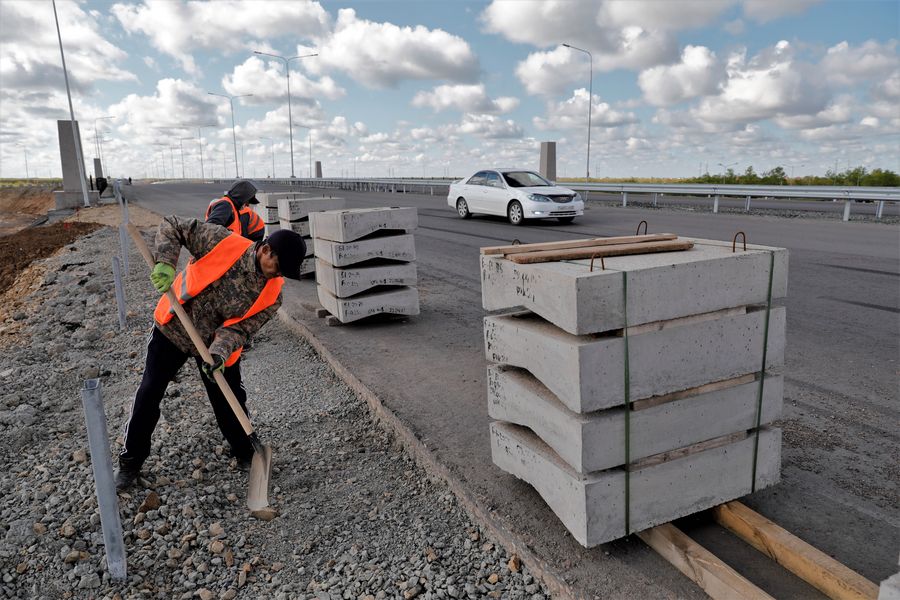
People work at the construction site of a ring road in Nur-Sultan, capital of Kazakhstan, May 4, 2020. (Photo by Kalizhan Ospanov/Xinhua)
In a recent interview with Russian broadcaster MIR TV, Kazakh President Kassym-Jomart Tokayev said the BRI corresponds to Kazakhstan's Bright Path new economic policy, a plan to modernize the country's infrastructure and develop its economy.
"We are building a mutually beneficial economic partnership, and cooperation between Kazakhstan and China is absolutely natural," Tokayev said. ■



